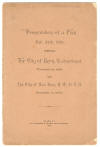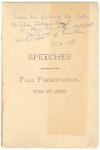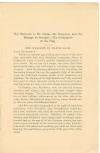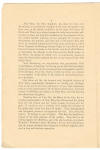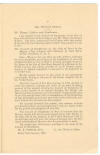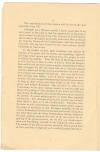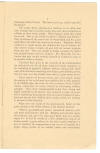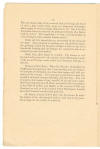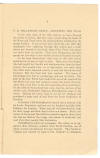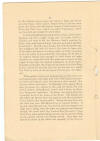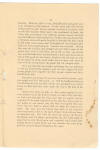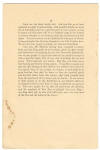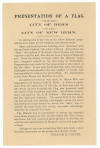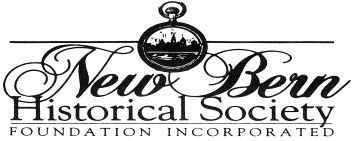
Presentation of a Flag, Feb. 27, 1896
Bibliographic information:
Presentation of a Flag, Feb. 27, 1896, from the City of Bern,
Switzerland, Founded 1191, to the City of New Bern, N.C., U.S.A. Founded in 1710
(New Bern, N.C.: N.S. Richardson and Son, 1896), 12 p. plus inserts. A
transcription of the speeches delivered in 1896 upon the presentation of a Flag
to the City of New Bern by the Swiss Minister to the U.S.
[Click on an image to enlarge that image.]
[front wrap]
Presentation of a Flag
Feb. 27th, 1896,
From
The City of Bern, Switzerland,
Founded in 1191,
To
The City of New Bern, N.C., U.S.A.
Founded in 1710.
-----
New Bern, N.C.
N.S. Richardson & Son, Book and Job Printers.
1896.
[p. 1]
SPEECHES
DELIVERED AT THE
FLAG PRESENTATION,
FEB. 27, 1896.
[Inscribed: "From the files of the late William Gibson Boyd. To Paul Cox, Esq., Mayor, The City of New Bern, Nov. 8, 1982. F.R.B."]
[p. 2, blank]
[p. 3]
The Welcome to Mr. Pioda---His Response, and the Message he Brought---The Acceptance of the Flag.
THE WELCOME BY MAYOR ELLIS.
YOUR EXCELLENCY:
Nearly two centuries ago, within a stone’s throw of this hereafter memorable hall, your illustrious countryman, Baron de Graffenreid, whom we hold in grateful remembrance, landed on these shores. He was met by a people, who, when their Great Spirit moved them, were well versed in extending a very warm reception. Amid the charming shrillness of the war-whoop, the fascinating twang of the bow, the magnetic flight of the barbed arrow, the skilled and finishing strokes of the tomakawk, and, sometime, “the tripping of the light fastastic toe,” they welcomed their guest to a feast, somewhat notable for its vehement, boisterrous beginning, and calm, quiet, still, though ominous temination.
Civilization, your Excellency, with the arts and sciences, education and religion, has, since that time, wrought many marvelous changes. You, Sir, are the distinguished representative of these brilliant achievements, on the other side of the water, whence DeGraffenried came, and we, a more humble one, on this side, where DeGraffenried landed.
Old Bern was then being rocked in the cradle of republican institutions, while New Bern, when DeGraffenried named her, had a local habitation only amid the untouched forest trees of the scarred and printed red man. Old Bern, the capital of the sweetest, most delightful, most romatic, most touchingly reminiscential spot on the map of all the European domain, has kept elastic step to the music of the centuries, and, to-day, holds her head erect, with radient and sparkling eyes, amid the culture and learning, the magnificence and splendor of the great cities of the world.
[p. 4]
New Bern, the little daughter, has done her best, your Excellency, to emulate the example of her dear old mother; and here, now, at the placid confluence of the same old rivers, the Neuse and Trent, over whose bosoms the early Swiss settlers sailed many a time, and dreamily meditated on the pregnant future, she nestles herself, rejoicing in her strength, her beauty, her attainments, her promise, and above all, in the potent fact, that she is an essential, integral part of this great government, which freely dispenses its blessings and privileges on every foot of earth that lies between Canada, on the North, and the Gulf of Mexico on the South, the Atlantic on the East, and the Pacific ocean on the West; the germs of which were so beneficently scattered, when the Swiss settler planted his feet on the shores of the “Old North State.”
Your Excellency, we congratulate that government, “The United States of America,” on having you as the illustrious diplomatic representative of the unchanged and unchangeable republic of Switzerland, where the liberty, which the Swiss ever adored, never trembles in the midst of the unrest of surrounding European dynasties.
But above all, Sir, the honored and delighted citizens of New Bern, congratulate themselves on having you, “fittingly clad, as you are in the robes and honors of your high diplomatic station, as the representative of the fond remembrance and kind wishes of Old Bern, the mother, to New Bern, the still growing and affectionate daughter.
Standing here, as I do, Sir, the Mayor of the City, the accredited representative of New Bern, her old men and her young men, her old women and her young women, her boys and her girls —I extend to you a welcome very unlike the welcome of the olden time—from her heart of hearts. Your distinguished and benignant presence has captured the city. It is yours, Sir, take it. It belongs to you, of rights. This day, the daughter is locked in the fond embrace of the mother. New Bern is the willing captive of Old Bern, and with glad acclaim, she shouts Welcome! Welcome! thrice Welcome! to you, Your Excellency, and the unique occasion that brings the two Berns together, after such a long and anxious separation.
[p. 5]
MR. PIODA’S REPLY.
Mr. Mayor, Ladies and Gentlemen:
I am charged by the Council of Burghesses of the City of Bern with the honor of delivering to you, Mr. Mayor, the Banner of Bern. The above mentioned Council joins with this symbol of the old City the following address which I am pleased to read to you:
The Council of Burghesses of the City of Bern to the Mayor, City Council and Citizens of New Bern, North Carolina, U. S. A.
Sirs:-—When, in the year 1891, the City of Bern celebrated the seven hundredth anniversary of her foundation, it was with gratification that we were enabled to welcome amongst our guests the Mayor of the City of New Bern, founded by a Bernese in the XVIII century, and which, mindful of its old Bernese origin, deputed its highest magistrate to take part in the festivities of its mother-city.
We felt greatly honored by this proof of true attachment and friendly feeling on the part of the distant daughter city in the United States.
The City Council of New Bern, having, in 1894, decided to adopt the armorial bearings and colors of our town, in lasting memory of the original kinship, the Council of Burghesses of Bern at the request of an eminent Burgher, Mr. George von Benoit, resolved to present you with a banner displaying the arms of our City and the date, 1891, in remembrance of the celebration of that memorable anniversary and of the birth of friendly relations between the two cities on this occasion.
We transmit herewith this symbol, now common to Swiss and American Bern, and accompanying it with our hearty wishes for the growth and prosperity of your city.
The Council of Burghesses of Bern is covinced that the Bernese banner will win as great respect and as high honors on the other side of the Atlantic, in the United States, as it did in its old home, and will prove the means of keeping alive the feeling of relationship of the two cities for generations to come.
We remain sirs, with sincere greetings in the name of the Council of Burghesses.
Dr. R. STETTLER, Sec’y.
A. von MURALT, Chmn.
BERN, 28th January, 1896.
[p. 6]
The remembrance of this mission will be one of the most agreeable of my life.
Although not a Bernese myself, I spent a good part of my early youth in Bern and so had the opportunity of acquiring a more intimate knowledge of the City, its people and their history, and to observe the dignity and loyalty with which Bern surrounds the Supreme Powers of the Confederation, and how deservedly this noble City has been honored by the whole country thereby indicating its trust in her.
In the twelfth century, after feudalism had reached the summit of its power and its decline was beginning, emperor’s and kings relied upon a new awaking force, the people, in order to restrain the nobility. Thus the Duke of Rachringen founded in 1191 the City of Bern in order to hold in check the Burgundian nobility and the City become a mighty stronghold for liberty. Many struggles for life and death had she to maintain against nobility, empire and foreign powers, and therefore the white color of the banner was changed to blood-red. But every battle found Bern stronger than before. Love of liberty inspired its brave citizens, wise and energetic statesmanship directed it government. As long as these virtues were kept awake in the City, Bern’s power and welfare flourished. Her accession in 1353 to the Confederacy to the early Cantons turned to mutual profit and effected the joining of other members to the Union until Switzerland during the European wars of the fifteenth century, attained the position of a great military power; to which Bern especially contributed. But, although glorious, this position was not beneficial either to Bern or to the Confederation. Therefore both, the latter as well as the former, adopted another policy, namely, the policy of neutrality in such European questions as did not concern Switzerland directly, Switzerland persevered in this policy, and after Bern and the Swiss Confederation having weathered the great political storm at the close of the last and at the beginning of the present century, the old City now stands regenerated and flourishing, crowned as the Capital of a free nation. The nimbus of her glorious history surrounds Bern’s proud head and her eyes look courageously and trustfully towards the future
[p. 7]
foreseeing nobler laurels. The bear as you see, strides upwards! Excelsior!
The noble Berna educates her children to be virile, that their courage may be as firm as the Alps and their patriotism as sublime as those snowy peaks. With vigorous arms they wield the sword. But on the sword is written: “Liberty and Justice.” Only in defense of the sacred soil of Switzerland and for a just cause Bern will allow the sword to be drawn. Therefore Berna endeavors to instill among her children the love of Justice, for they observe justice towards all and will not tolerate injustice from any one. They are taught to decide questions by lawful and peaceful means and not violence. For Berna has the conviction that man cannot consider himself as civilized so long as he permits violence of arms.
Therefore Bern gives in the councils of the Confederation her influential vote for all those initiatives which contribute to the unfolding of peaceful relations between nations and which make of Switzerland something more than a great military power, that is to say, as it has already been called, a great moral power.
Every member of human society, and every people among the nations of the world must have ambition for a noble purpose. In the Middle-Ages Bern and the other members of the Confederation endeavored to secure liberty by developing military strength. Now their commonwealth being free, strong and highly esteemed by all nations, they endeavor to make its power felt in furthering the progress of the general civilization of mankind and try not to be behind those nations which are farthest in advance in this direction.
What were the words of the great-hearted father of this great country to his fellow-citizens in his farewell address?
“Observe good faith and justice towards all nations; cultivate peace and harmony with all. Religion and morality enjoin this conduct; and can it be, that good policy does not equally enjoin it? It will be worthy of a free enlightened, and, at no distant period, a great nation, (he has been a good prophet,) to give to mankind the magnanimous and too novel example of a people always guided by an exalted justice and benevolence.
[p. 8]
Who can doubt, that, in the course of time and things, the fruits of such a plan would richly repay any temporary advantages, which might be lost by a steady adherence to it? Can it be, that Providence has not connected the permanent felicity of a Nation with its virtue? The experiment, at least, is recommended by every sentiment with ennobles human nature.”
Noble old City beyond the sea, surrounded by the Jura and the Alps! Thou returnest in handing over thy glorious banner the greetings which thy daughter brought to thee on thy seven hundredth birthday and the homage she rendered to thee in assuming thy colors and symbol.
Noble City, thou mayst be trustful: Thy banner is well kept and well preserved in the country where Washington’s noble words are still living—words which are in harmony with thy endeavors.
Citizens of New Bern: When the Bernese, Christopher de Graffenried, founded your city, it was standing here as a dangerous out-post of civilization at a time when savages still held possession of the country. Your ancestors contributed to make this beautiful and great country habitable, and then free. You will be loyal to this banner if you, mindful of its and your origin, shall keep awake the love of liberty and justice which is common to the Cities of Erlach and Haller, to the country of Tell and Pestalozzi, as well as to the country which Washington founded and which Lincoln ennobled and preserved.
Mr. Mayor, citizens of New Bern: Let this banner fly under the shadow of the star spangled banner; both lead to the peaceful struggle for the welfare of mankind.
[p. 9]
P.H. PELLETIER’S REPLY, ACCEPTING THE FLAG.
In the early dawn of the 18th century, we learn through the annals of history, that there only existed along the banks of the Neuse and Trent rivers, the primeval forest inhabited by the savage Indians. It was at this time, about the year 1707 that immigrants were exploring through this section and a small colony was located on the South bank of the Trent river about two miles from its mouth. These were Huguenots, and they spread out into what is now Onslow, Jones and Carteret counties.
In far away Switzerland, there were at this time serious problems for its men of state to solve. Many were the refugees who had sought her friendly and kind protection from the hated tyranny that goaded them on to desperation, and made them leave their native land and country to seek this land of love and freedom! But the limit had been reached. The homes of Switzerland were full to overflowing; and now for relief. The fame of the New World had reached the ears of the people of the Old World and many had reached in safety this haven of retreat, where they could draw in the full inspiration of love and liberty. To the relief of Switzerland then came America, and one of her noblest sons, Christopher Emanuel DeGraffenried, came to the rescue. Leaving his native land he set out for England and purchased a large tract of land from the Lords Proprietors of Carolina.
In October 1709 DeGraffenried entered into a contract with the Lords Proprietors and sent out six hundred and fifty (650) Palatines for America. These were all well provided for, both for their voyage and their stay in their new homes. But in the storms of the sea and the robberies committed against them, those who had not died on the voyage were almost in destitution and want when they reached their destination.
DeGraffenried could not accompany this colony, so lie appointed three directors, notables from North Carolina, one of whom it seems was Lawsons, Surveyor General. They landed in Virginia and traveled by land to Col. Pollock’s in Albemarle
[p. 10]
on the Chowan, thence across the sound to Bath, and thence on to the Neuse, where Lawson located them on his own lands across the Trent, and sold them a tongue of land between the Neuse and Trent river, which was called “Chattawka,” which was then held and occupied by the Indians.
In 1710 DeGraffenried joined the Swiss colony at New Castle, England, and after a happy voyage, they were safely landed in Virginia, and came as did the Palatines, finally reaching the Neuse, where a sad state of things, “sickness, want and desperation greeted him.” His life was in danger, but with the greatest possible judgment and with his heart in the work he began with all his might and main to set things right; in which, according to his own words, he most admirably succeeding, for he tells us “in eighteen months they managed to build homes and make themselves so comfortable that they made more progress in that length of time than the English inhabitants in several years.” DeGraffenried bought this tongue of land from the Indian King, Taylor, and thus it was that this City was founded and named New Bern, in honor of the birth-place of its founder, DeGraffenried.
With grateful hearts and thanksgivings to God, these true and honest people went about their work with diligence and perseverance and enjoyed peace and plenty as their reward. But who can divine the future? In September 1711, taking fifteen days provisions, two negroes to row—and for safety, two well known Indians, DeGraffenried started with Lawson up Neuse river for general exploration. No danger was apprehended, for no savages lived on the banks of the Neuse. The Indian, who had ridden the Baron’s horse was captured and when questioned by the Indians, they became afraid. Taking the horse from him and bade him warn DeGraffenried not to proceed further. It was late when this bad news was received, and they stopped over night near a spring where the party was captured and hastened through the woods until they reached King Hencock’s village where forty elders and the King around a big fire and all sitting on the ground, entered into solemn council. Here they complained of abuses by the whites and especially of the Surveyor
[p. 11]
General. However, after a vote, DeGraffenried and party were to be liberated on the morrow. In the mean time other of the Indians arrived, and Lawson became involved in a quarrel with one of these and the hole party was condemned to death but before this punishment was inflicted, another council was held and DeGraffenried had implored an Indian who was dressed like a Christian and could speak English to intercede for him, which he did with such success that DeGraffenried was released after about six weeks imprisonment. Lawson was executed. During this time the Indians had pillaged all and killed many of the people who lived in New Bern, but at last a treaty was entered into, and DeGraffenried was furnished a horse and instructed to ride at full speed for two hours, which he did and kept on with all the speed his horse could make for two days, and when he arrived at his strong house, the people did not recognize him.
So it was that the once bright and happy sky was darkened by the war cloud of the Indians, and the once happy and prosperous people were engulfed by their savage enemies and but a handful was left.
But peace and prosperity once more perched her banner upon this people and New Bern grew. In 1713 De Graffenried having lost his fortune, left the land which once promised to be such a haven to him and once more made his way to the land of his birth.
And so it is that to-night, we have come together to celebrate another era in the history of this our native City, and when we look back through the long years that are passed, and are reminded of the many important events that have taken place in our midst, we can assure you, Sir, that your capital City need never bow her head in shame that we claim her name as our name. The same love for liberty that dwelt in the hearts of your countrymen while in the land of their birth, did not lessen on American soil. But with the land, the waters, the flowers, the forests and all nature proclaiming the free birth-right of man, that love for liberty grew and expanded until at last with mighty power it burst forth and tore asunder the yoke of oppression and proclaimed themselves free men.
[p. 12]
Such are the facts briefly told. And now Sir, as we have gathered to-night to acknowledge with greatful hearts one more act of friendship and love upon the part of your people, we beg to assure you that there will be no brighter page in our history or sweeter thought in our memory, than the remembrance of this night. To your country we are indebted for that gem of liberty loving principle that has been brought to its full fruition here. To you and your people we pledge our sincerest friendship.
And now, Mr. Minister having been requested to receive from you this Flag, made by your people, given by your people and delivered in our keeping by you, the Honorable Representative of your people; I beg in the name of my people to accept it with a grateful heart, full of love and friendship for you and yours. Your colors are our colors. May they ever wave over a God fearing and liberty loving people. I beg, Sir, to assure you that the safe keeping of this emblem of a mother’s love will ever be a sacred duty of our people, no danger, or peril shall be so great but that they shall be brave to keep the spoilers hands and the dust stains, from this banner, that shall proudly float from the mast-head of our honor and our hearts. In our success it shall always be in the fore-front, in our defeat it shall not be allowed to trail in the dust so long as manhood can prevent it. Tell your people for us, that the patriotism, the chivalry, and the manhood of New Bern is pledged that your Flag— our Flag shall, side by side with Old Glory, wave “over the land of the free and the home of the brave.”
[newspaper clippings insert]
NEWBERN’S FAIR.
Newbern is making unusual preparations for the fish, oyster and game fair Feb. 26-28. One of the features will be the presentation of a flag, sent by the city of Berne, Switzerland. The Swiss Minister to this country will make the presentation. Some years ago, Mayor Manly, of Newbern went to Berne as the representative of the latter city’s thriving namesake. There are to be four balloon ascensions during the fair. Newbern’s fine, new shell roads and streets have caused a remarkable increase in the number of bicycles there.
From Berne to New Berne
A Flag Presentation From The Mother City.
To be Made by the Swiss Minister, J. B. Pioda, During Fair Week—The Day Will be Determined To—night.
Mr. W. E Christian, Washington correspondent of the News & Observer, says in a special dated Feb’y 8th:
“Mr. James Bryan. of Newbern, in company with Dr. G. W. Sanderlin, called on the Swiss Minister yesterday.
“The Mayor of Newbern had been informed that the city of Bern, in Switzerland, had sent a flag to be presented to the city of New Bern, and that it is now in the hands of the Swiss Minister. Mr. Bryan called on him yesterday to invite him to present the flag at the New Bern Fair.
“The Minister accepted the invitation, and accepted an invitation also in behalf of his wife, who will accompany him.”
Mayor Ellis of this city has received the following letter from the Swiss Minister who will make the presentation:
Le Ministre Washington, D. C.,
De Suissi February 7th, 1896.
Dear Sir:—I have the honor to inform you that I have been asked by the City of Berne in Switzerland to transmit to you as Mayor of New Berne, the flag of Berne, as a sign of rememberance and friendship. It is with great pleasure that I have accepted this commission, which will give me the opportunity to visit your city and to make the acquaintance of the descendants of many old Swiss families. For this purpose I intend to come to New Berne in the last week of this month and I should be obliged to you if you could let me know which day you would consider the most convenient for the reception of the flag.
Awaiting your kind answer, I remain, Dear Sir, with the assurance of my high consideration,
Respectfully yours, J.B PIODA, Swiss Minister.
The City Council will hold a special meeting tonight to determine upon the date and will notify Mr. Pioda thereof at once.
The presentation will doubtless be an interesting event.
[insert]
PRESENTATION OF A FLAG
--FROM THE--
CITY OF BERN
--TO THE--
CITY OF NEW BERN.
-----
In anticipation of the visit of the Swiss Minister, preparations were made for his reception and entertainment.
Many public and private buildings were decorated with red and black bunting, (the colors of Bern.) Everywhere the “Bear,” the emblem of the Swiss, was to be seen and scarcely a person could be met, who did not have a badge of black and red. From the display of these colors the Minister might have imagined himself in his own home in Switzerland. Preparations were made for the presentation to take place at the City Hall. It was soon found that this place was totally inadequate to accommodate the vast number of people who had assembled to witness the proceedings. An adjournment to the Court House was therefore necessary.
An address of welcome was made by Mayor Ellis and responded to by Minister John B. Pioda. A letter on parchment from the authorities of the City of Bern was read by Mr. Pioda, and the beautiful silk Flag was presented amid the cheers of the assembled multitude. An address of acceptance was made by Mr. P. H. Pelletier. The decorations at the City Hall were elaborate. The entire front of the building was covered with bunting, and designs; across the street was stretched a large banner on which the “Bear” was inscribed; the inner walls and ceiling was made exceedingly attractive by a special decorator.
The Minister had an opportunity of seeing the beautiful truck farms around our city; he also visited the Fish, Oyster and Game Fair and expressed great pleasure in viewing the exhibits and astonishment at the great variety and magnitude of them.
Perhaps no one ever visited New Bern who made a more favorable impression on the people than did Mr. Pioda.
WILLIAM H. OLIVER.
Return to Craven County Digital History Exhibit
Images scanned by Dean Knight.
Text prepared by Victor T. Jones, Jr.
Last edited: August 21, 2018
